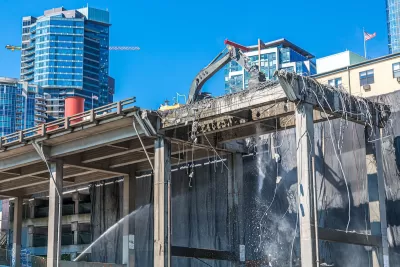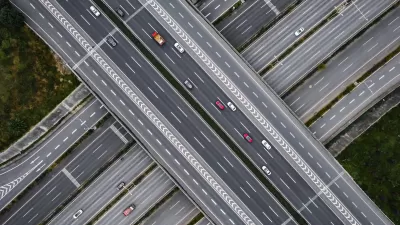Resistance from state transportation departments and precarious funding sources mean highway removal projects are few and far between, despite their benefits.

Highway removal: why isn’t it happening in more places? Joe Harrington poses this question in Next City, noting that “The benefits [of removal] for the communities living along highways are obvious: People have experienced health, environmental, economic and mobility harms for the last 70 years. Communities originally displaced lost billions in generational wealth opportunities in the ensuing displacement and residents today continue to bear harm.”
Harrington lists several reasons that highway removal is not more popular yet. These include “sluggish policy responses” at the federal level that have failed to keep up with the data. Even the Reconnecting Communities program, which is specifically aimed at removing highways, has not resulted in many actual removals. According to Harrington, “There’s an urgent need for federal guidance to leverage successful highway removal initiatives, enabling more cities to pursue this transformative approach.”
Highway removal projects are also stymied by an outdated mindset pervasive in state transportation departments. “Their entrenched traffic engineering mindsets, earmarked funding and institutional resistance to change impede efforts to promote alternatives to highways, from Minnesota to Texas.”
For Harrington, “Current procedures and technical practices—built by and for highway projects—need to shift as we focus on restoring divided neighborhoods, advancing our climate resilience and creating equitable cities.”
FULL STORY: It’s time to start removing highways. For real this time

Planetizen Federal Action Tracker
A weekly monitor of how Trump’s orders and actions are impacting planners and planning in America.

Congressman Proposes Bill to Rename DC Metro “Trump Train”
The Make Autorail Great Again Act would withhold federal funding to the system until the Washington Metropolitan Area Transit Authority (WMATA), rebrands as the Washington Metropolitan Authority for Greater Access (WMAGA).

DARTSpace Platform Streamlines Dallas TOD Application Process
The Dallas transit agency hopes a shorter permitting timeline will boost transit-oriented development around rail stations.

Renters Now Outnumber Homeowners in Over 200 US Suburbs
High housing costs in city centers and the new-found flexibility offered by remote work are pushing more renters to suburban areas.

The Tiny, Adorable $7,000 Car Turning Japan Onto EVs
The single seat Mibot charges from a regular plug as quickly as an iPad, and is about half the price of an average EV.

Supreme Court Ruling in Pipeline Case Guts Federal Environmental Law
The decision limits the scope of a federal law that mandates extensive environmental impact reviews of energy, infrastructure, and transportation projects.
Urban Design for Planners 1: Software Tools
This six-course series explores essential urban design concepts using open source software and equips planners with the tools they need to participate fully in the urban design process.
Planning for Universal Design
Learn the tools for implementing Universal Design in planning regulations.
Municipality of Princeton
Roanoke Valley-Alleghany Regional Commission
City of Mt Shasta
City of Camden Redevelopment Agency
City of Astoria
Transportation Research & Education Center (TREC) at Portland State University
US High Speed Rail Association
City of Camden Redevelopment Agency
Municipality of Princeton (NJ)





























